Research Report: William Shu, Deliveroo, and Entrepreneurial Success
VerifiedAdded on 2023/01/11
|9
|2516
|48
Report
AI Summary
This individual research report examines the entrepreneurial journey of William Shu, the co-founder and CEO of Deliveroo, a British online food delivery company. The report delves into Shu's background, the inception of Deliveroo, and the company's mission to deliver food from local restaurants. It highlights the importance of innovation in the company's success, particularly in attracting customers and expanding its operations. The report analyzes the challenges faced by Shu, including initial difficulties in securing restaurant partnerships and managing delivery logistics, as well as criticisms regarding employee pay. The report further explores Shu's approach to business, including his use of technology and his views on the key factors for entrepreneurial success, such as passion and perseverance. The report also includes a topic guide with questions regarding innovation, the decision to start the business, interesting facts about Shu, and the challenges faced during setup. Finally, the report relates the case study to entrepreneurial theories, emphasizing the role of innovation and the entrepreneur's psychological aspects in achieving success.

Individual research report
Paraphrase This Document
Need a fresh take? Get an instant paraphrase of this document with our AI Paraphraser

Contents
INTRODUCTION...............................................................................................................................3
MAIN BODY.......................................................................................................................................3
Identify and select an entrepreneur....................................................................................................3
Prepare the topic guide......................................................................................................................5
Analyse data......................................................................................................................................6
Relate to theory.................................................................................................................................6
CONCLUSION....................................................................................................................................7
REFERENCES....................................................................................................................................8
INTRODUCTION...............................................................................................................................3
MAIN BODY.......................................................................................................................................3
Identify and select an entrepreneur....................................................................................................3
Prepare the topic guide......................................................................................................................5
Analyse data......................................................................................................................................6
Relate to theory.................................................................................................................................6
CONCLUSION....................................................................................................................................7
REFERENCES....................................................................................................................................8
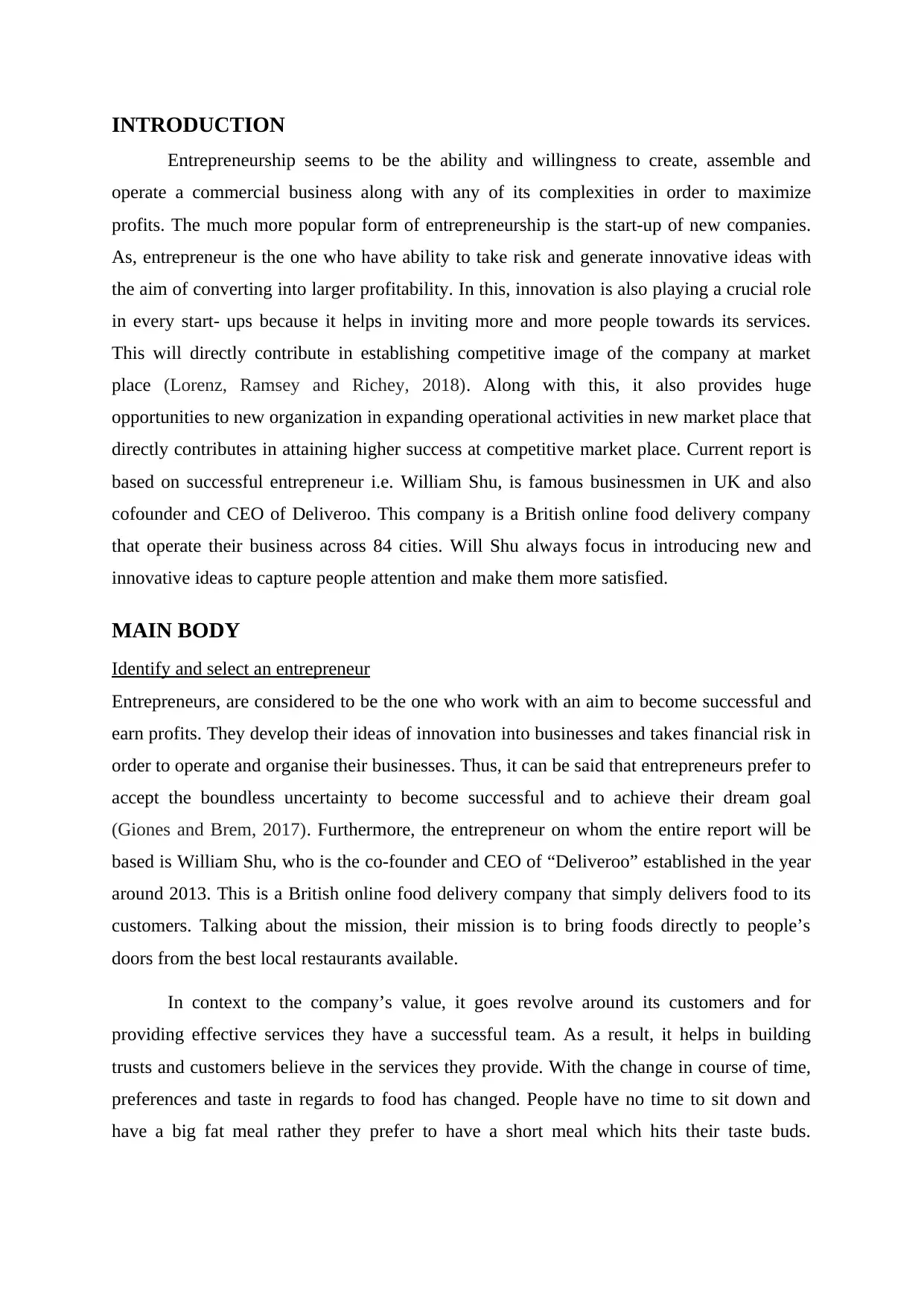
INTRODUCTION
Entrepreneurship seems to be the ability and willingness to create, assemble and
operate a commercial business along with any of its complexities in order to maximize
profits. The much more popular form of entrepreneurship is the start-up of new companies.
As, entrepreneur is the one who have ability to take risk and generate innovative ideas with
the aim of converting into larger profitability. In this, innovation is also playing a crucial role
in every start- ups because it helps in inviting more and more people towards its services.
This will directly contribute in establishing competitive image of the company at market
place (Lorenz, Ramsey and Richey, 2018). Along with this, it also provides huge
opportunities to new organization in expanding operational activities in new market place that
directly contributes in attaining higher success at competitive market place. Current report is
based on successful entrepreneur i.e. William Shu, is famous businessmen in UK and also
cofounder and CEO of Deliveroo. This company is a British online food delivery company
that operate their business across 84 cities. Will Shu always focus in introducing new and
innovative ideas to capture people attention and make them more satisfied.
MAIN BODY
Identify and select an entrepreneur
Entrepreneurs, are considered to be the one who work with an aim to become successful and
earn profits. They develop their ideas of innovation into businesses and takes financial risk in
order to operate and organise their businesses. Thus, it can be said that entrepreneurs prefer to
accept the boundless uncertainty to become successful and to achieve their dream goal
(Giones and Brem, 2017). Furthermore, the entrepreneur on whom the entire report will be
based is William Shu, who is the co-founder and CEO of “Deliveroo” established in the year
around 2013. This is a British online food delivery company that simply delivers food to its
customers. Talking about the mission, their mission is to bring foods directly to people’s
doors from the best local restaurants available.
In context to the company’s value, it goes revolve around its customers and for
providing effective services they have a successful team. As a result, it helps in building
trusts and customers believe in the services they provide. With the change in course of time,
preferences and taste in regards to food has changed. People have no time to sit down and
have a big fat meal rather they prefer to have a short meal which hits their taste buds.
Entrepreneurship seems to be the ability and willingness to create, assemble and
operate a commercial business along with any of its complexities in order to maximize
profits. The much more popular form of entrepreneurship is the start-up of new companies.
As, entrepreneur is the one who have ability to take risk and generate innovative ideas with
the aim of converting into larger profitability. In this, innovation is also playing a crucial role
in every start- ups because it helps in inviting more and more people towards its services.
This will directly contribute in establishing competitive image of the company at market
place (Lorenz, Ramsey and Richey, 2018). Along with this, it also provides huge
opportunities to new organization in expanding operational activities in new market place that
directly contributes in attaining higher success at competitive market place. Current report is
based on successful entrepreneur i.e. William Shu, is famous businessmen in UK and also
cofounder and CEO of Deliveroo. This company is a British online food delivery company
that operate their business across 84 cities. Will Shu always focus in introducing new and
innovative ideas to capture people attention and make them more satisfied.
MAIN BODY
Identify and select an entrepreneur
Entrepreneurs, are considered to be the one who work with an aim to become successful and
earn profits. They develop their ideas of innovation into businesses and takes financial risk in
order to operate and organise their businesses. Thus, it can be said that entrepreneurs prefer to
accept the boundless uncertainty to become successful and to achieve their dream goal
(Giones and Brem, 2017). Furthermore, the entrepreneur on whom the entire report will be
based is William Shu, who is the co-founder and CEO of “Deliveroo” established in the year
around 2013. This is a British online food delivery company that simply delivers food to its
customers. Talking about the mission, their mission is to bring foods directly to people’s
doors from the best local restaurants available.
In context to the company’s value, it goes revolve around its customers and for
providing effective services they have a successful team. As a result, it helps in building
trusts and customers believe in the services they provide. With the change in course of time,
preferences and taste in regards to food has changed. People have no time to sit down and
have a big fat meal rather they prefer to have a short meal which hits their taste buds.
⊘ This is a preview!⊘
Do you want full access?
Subscribe today to unlock all pages.

Trusted by 1+ million students worldwide
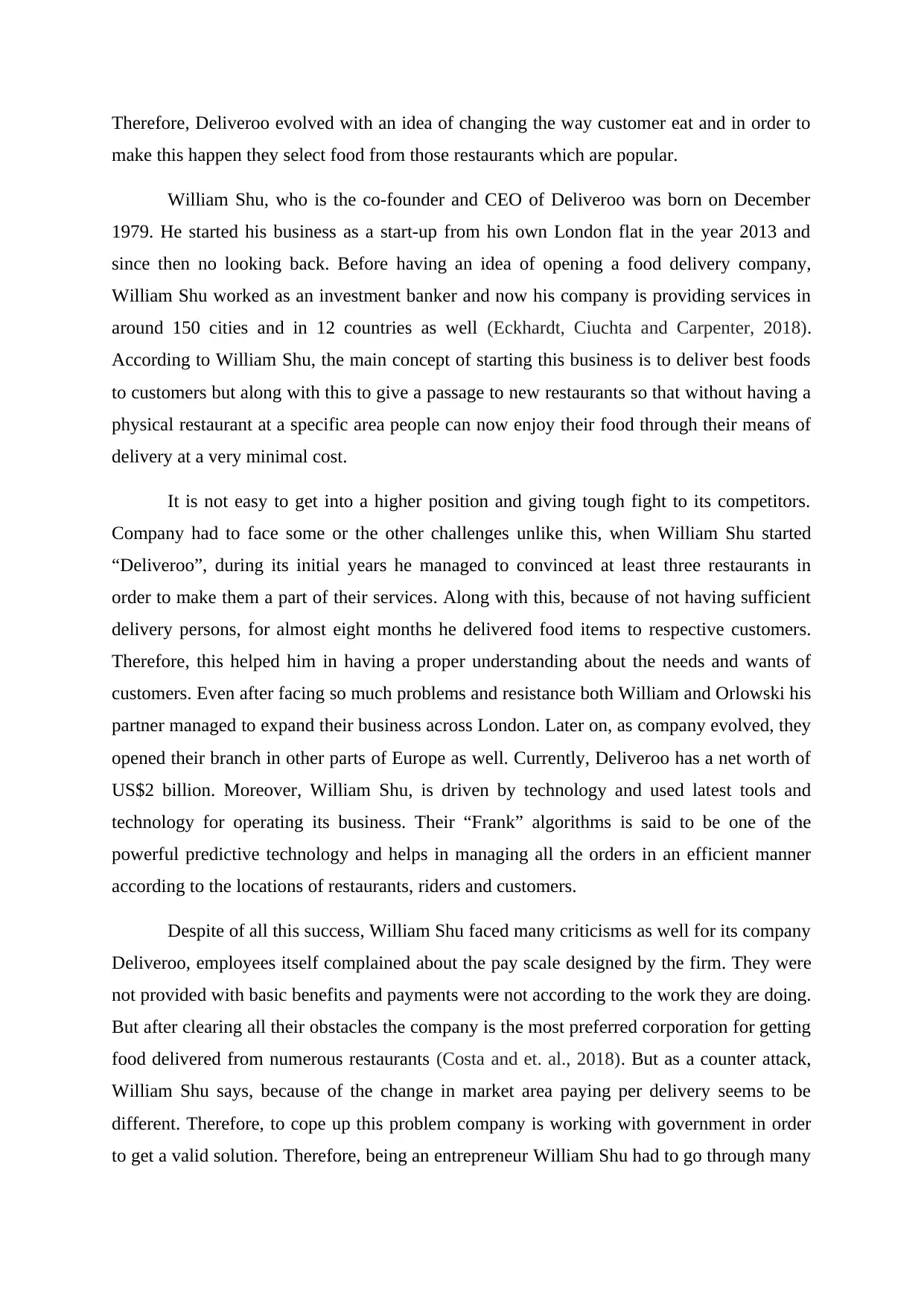
Therefore, Deliveroo evolved with an idea of changing the way customer eat and in order to
make this happen they select food from those restaurants which are popular.
William Shu, who is the co-founder and CEO of Deliveroo was born on December
1979. He started his business as a start-up from his own London flat in the year 2013 and
since then no looking back. Before having an idea of opening a food delivery company,
William Shu worked as an investment banker and now his company is providing services in
around 150 cities and in 12 countries as well (Eckhardt, Ciuchta and Carpenter, 2018).
According to William Shu, the main concept of starting this business is to deliver best foods
to customers but along with this to give a passage to new restaurants so that without having a
physical restaurant at a specific area people can now enjoy their food through their means of
delivery at a very minimal cost.
It is not easy to get into a higher position and giving tough fight to its competitors.
Company had to face some or the other challenges unlike this, when William Shu started
“Deliveroo”, during its initial years he managed to convinced at least three restaurants in
order to make them a part of their services. Along with this, because of not having sufficient
delivery persons, for almost eight months he delivered food items to respective customers.
Therefore, this helped him in having a proper understanding about the needs and wants of
customers. Even after facing so much problems and resistance both William and Orlowski his
partner managed to expand their business across London. Later on, as company evolved, they
opened their branch in other parts of Europe as well. Currently, Deliveroo has a net worth of
US$2 billion. Moreover, William Shu, is driven by technology and used latest tools and
technology for operating its business. Their “Frank” algorithms is said to be one of the
powerful predictive technology and helps in managing all the orders in an efficient manner
according to the locations of restaurants, riders and customers.
Despite of all this success, William Shu faced many criticisms as well for its company
Deliveroo, employees itself complained about the pay scale designed by the firm. They were
not provided with basic benefits and payments were not according to the work they are doing.
But after clearing all their obstacles the company is the most preferred corporation for getting
food delivered from numerous restaurants (Costa and et. al., 2018). But as a counter attack,
William Shu says, because of the change in market area paying per delivery seems to be
different. Therefore, to cope up this problem company is working with government in order
to get a valid solution. Therefore, being an entrepreneur William Shu had to go through many
make this happen they select food from those restaurants which are popular.
William Shu, who is the co-founder and CEO of Deliveroo was born on December
1979. He started his business as a start-up from his own London flat in the year 2013 and
since then no looking back. Before having an idea of opening a food delivery company,
William Shu worked as an investment banker and now his company is providing services in
around 150 cities and in 12 countries as well (Eckhardt, Ciuchta and Carpenter, 2018).
According to William Shu, the main concept of starting this business is to deliver best foods
to customers but along with this to give a passage to new restaurants so that without having a
physical restaurant at a specific area people can now enjoy their food through their means of
delivery at a very minimal cost.
It is not easy to get into a higher position and giving tough fight to its competitors.
Company had to face some or the other challenges unlike this, when William Shu started
“Deliveroo”, during its initial years he managed to convinced at least three restaurants in
order to make them a part of their services. Along with this, because of not having sufficient
delivery persons, for almost eight months he delivered food items to respective customers.
Therefore, this helped him in having a proper understanding about the needs and wants of
customers. Even after facing so much problems and resistance both William and Orlowski his
partner managed to expand their business across London. Later on, as company evolved, they
opened their branch in other parts of Europe as well. Currently, Deliveroo has a net worth of
US$2 billion. Moreover, William Shu, is driven by technology and used latest tools and
technology for operating its business. Their “Frank” algorithms is said to be one of the
powerful predictive technology and helps in managing all the orders in an efficient manner
according to the locations of restaurants, riders and customers.
Despite of all this success, William Shu faced many criticisms as well for its company
Deliveroo, employees itself complained about the pay scale designed by the firm. They were
not provided with basic benefits and payments were not according to the work they are doing.
But after clearing all their obstacles the company is the most preferred corporation for getting
food delivered from numerous restaurants (Costa and et. al., 2018). But as a counter attack,
William Shu says, because of the change in market area paying per delivery seems to be
different. Therefore, to cope up this problem company is working with government in order
to get a valid solution. Therefore, being an entrepreneur William Shu had to go through many
Paraphrase This Document
Need a fresh take? Get an instant paraphrase of this document with our AI Paraphraser
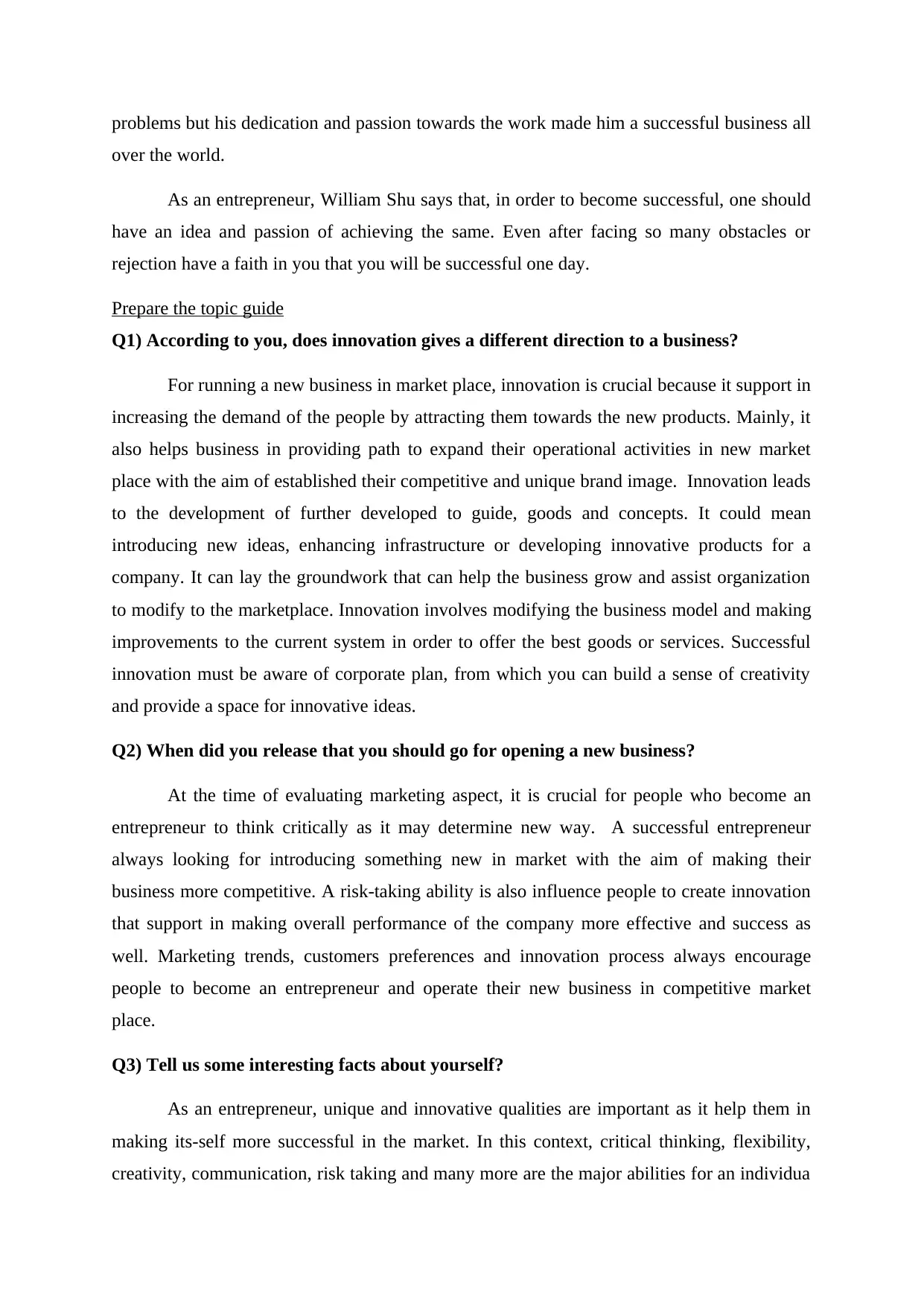
problems but his dedication and passion towards the work made him a successful business all
over the world.
As an entrepreneur, William Shu says that, in order to become successful, one should
have an idea and passion of achieving the same. Even after facing so many obstacles or
rejection have a faith in you that you will be successful one day.
Prepare the topic guide
Q1) According to you, does innovation gives a different direction to a business?
For running a new business in market place, innovation is crucial because it support in
increasing the demand of the people by attracting them towards the new products. Mainly, it
also helps business in providing path to expand their operational activities in new market
place with the aim of established their competitive and unique brand image. Innovation leads
to the development of further developed to guide, goods and concepts. It could mean
introducing new ideas, enhancing infrastructure or developing innovative products for a
company. It can lay the groundwork that can help the business grow and assist organization
to modify to the marketplace. Innovation involves modifying the business model and making
improvements to the current system in order to offer the best goods or services. Successful
innovation must be aware of corporate plan, from which you can build a sense of creativity
and provide a space for innovative ideas.
Q2) When did you release that you should go for opening a new business?
At the time of evaluating marketing aspect, it is crucial for people who become an
entrepreneur to think critically as it may determine new way. A successful entrepreneur
always looking for introducing something new in market with the aim of making their
business more competitive. A risk-taking ability is also influence people to create innovation
that support in making overall performance of the company more effective and success as
well. Marketing trends, customers preferences and innovation process always encourage
people to become an entrepreneur and operate their new business in competitive market
place.
Q3) Tell us some interesting facts about yourself?
As an entrepreneur, unique and innovative qualities are important as it help them in
making its-self more successful in the market. In this context, critical thinking, flexibility,
creativity, communication, risk taking and many more are the major abilities for an individua
over the world.
As an entrepreneur, William Shu says that, in order to become successful, one should
have an idea and passion of achieving the same. Even after facing so many obstacles or
rejection have a faith in you that you will be successful one day.
Prepare the topic guide
Q1) According to you, does innovation gives a different direction to a business?
For running a new business in market place, innovation is crucial because it support in
increasing the demand of the people by attracting them towards the new products. Mainly, it
also helps business in providing path to expand their operational activities in new market
place with the aim of established their competitive and unique brand image. Innovation leads
to the development of further developed to guide, goods and concepts. It could mean
introducing new ideas, enhancing infrastructure or developing innovative products for a
company. It can lay the groundwork that can help the business grow and assist organization
to modify to the marketplace. Innovation involves modifying the business model and making
improvements to the current system in order to offer the best goods or services. Successful
innovation must be aware of corporate plan, from which you can build a sense of creativity
and provide a space for innovative ideas.
Q2) When did you release that you should go for opening a new business?
At the time of evaluating marketing aspect, it is crucial for people who become an
entrepreneur to think critically as it may determine new way. A successful entrepreneur
always looking for introducing something new in market with the aim of making their
business more competitive. A risk-taking ability is also influence people to create innovation
that support in making overall performance of the company more effective and success as
well. Marketing trends, customers preferences and innovation process always encourage
people to become an entrepreneur and operate their new business in competitive market
place.
Q3) Tell us some interesting facts about yourself?
As an entrepreneur, unique and innovative qualities are important as it help them in
making its-self more successful in the market. In this context, critical thinking, flexibility,
creativity, communication, risk taking and many more are the major abilities for an individua
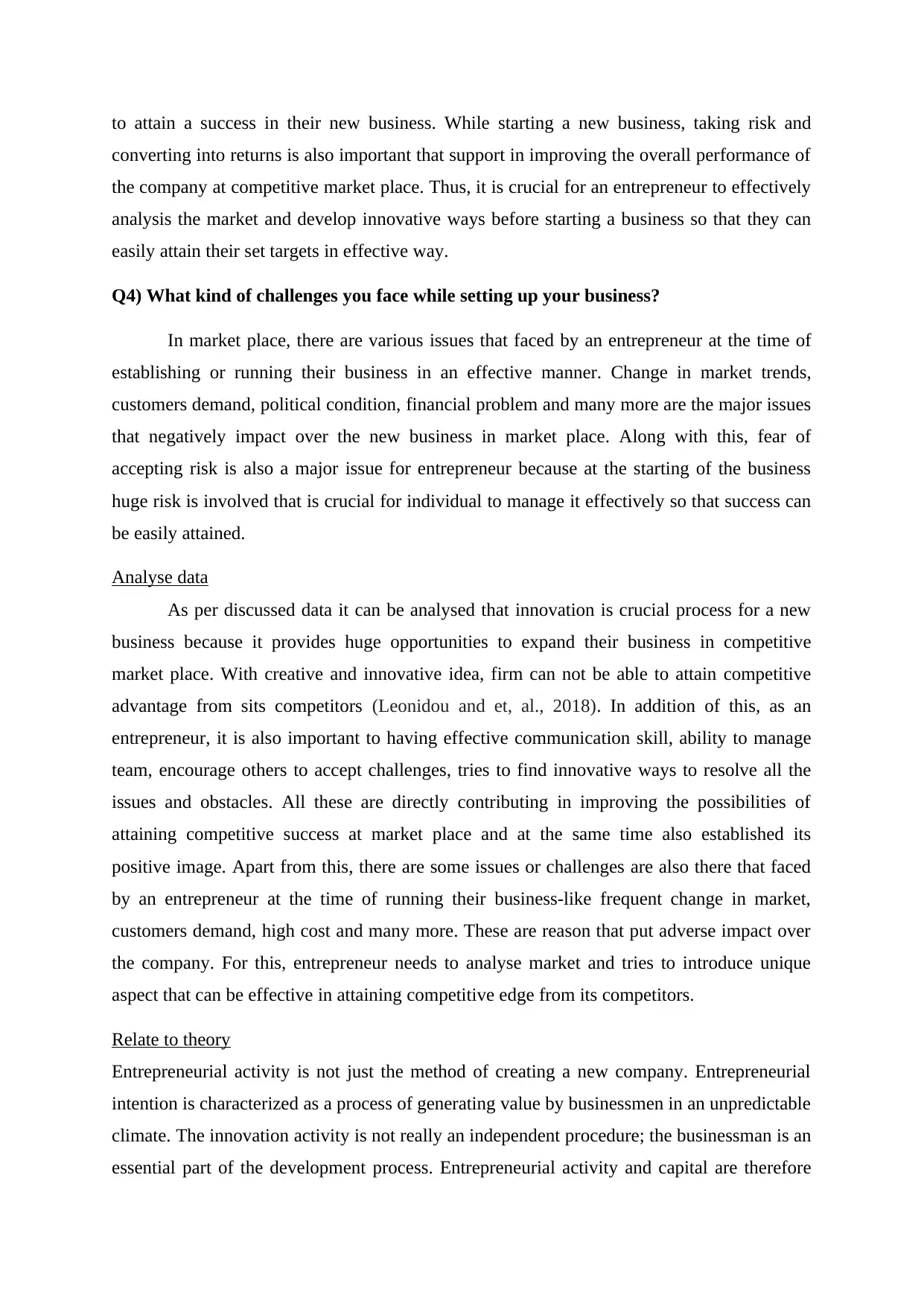
to attain a success in their new business. While starting a new business, taking risk and
converting into returns is also important that support in improving the overall performance of
the company at competitive market place. Thus, it is crucial for an entrepreneur to effectively
analysis the market and develop innovative ways before starting a business so that they can
easily attain their set targets in effective way.
Q4) What kind of challenges you face while setting up your business?
In market place, there are various issues that faced by an entrepreneur at the time of
establishing or running their business in an effective manner. Change in market trends,
customers demand, political condition, financial problem and many more are the major issues
that negatively impact over the new business in market place. Along with this, fear of
accepting risk is also a major issue for entrepreneur because at the starting of the business
huge risk is involved that is crucial for individual to manage it effectively so that success can
be easily attained.
Analyse data
As per discussed data it can be analysed that innovation is crucial process for a new
business because it provides huge opportunities to expand their business in competitive
market place. With creative and innovative idea, firm can not be able to attain competitive
advantage from sits competitors (Leonidou and et, al., 2018). In addition of this, as an
entrepreneur, it is also important to having effective communication skill, ability to manage
team, encourage others to accept challenges, tries to find innovative ways to resolve all the
issues and obstacles. All these are directly contributing in improving the possibilities of
attaining competitive success at market place and at the same time also established its
positive image. Apart from this, there are some issues or challenges are also there that faced
by an entrepreneur at the time of running their business-like frequent change in market,
customers demand, high cost and many more. These are reason that put adverse impact over
the company. For this, entrepreneur needs to analyse market and tries to introduce unique
aspect that can be effective in attaining competitive edge from its competitors.
Relate to theory
Entrepreneurial activity is not just the method of creating a new company. Entrepreneurial
intention is characterized as a process of generating value by businessmen in an unpredictable
climate. The innovation activity is not really an independent procedure; the businessman is an
essential part of the development process. Entrepreneurial activity and capital are therefore
converting into returns is also important that support in improving the overall performance of
the company at competitive market place. Thus, it is crucial for an entrepreneur to effectively
analysis the market and develop innovative ways before starting a business so that they can
easily attain their set targets in effective way.
Q4) What kind of challenges you face while setting up your business?
In market place, there are various issues that faced by an entrepreneur at the time of
establishing or running their business in an effective manner. Change in market trends,
customers demand, political condition, financial problem and many more are the major issues
that negatively impact over the new business in market place. Along with this, fear of
accepting risk is also a major issue for entrepreneur because at the starting of the business
huge risk is involved that is crucial for individual to manage it effectively so that success can
be easily attained.
Analyse data
As per discussed data it can be analysed that innovation is crucial process for a new
business because it provides huge opportunities to expand their business in competitive
market place. With creative and innovative idea, firm can not be able to attain competitive
advantage from sits competitors (Leonidou and et, al., 2018). In addition of this, as an
entrepreneur, it is also important to having effective communication skill, ability to manage
team, encourage others to accept challenges, tries to find innovative ways to resolve all the
issues and obstacles. All these are directly contributing in improving the possibilities of
attaining competitive success at market place and at the same time also established its
positive image. Apart from this, there are some issues or challenges are also there that faced
by an entrepreneur at the time of running their business-like frequent change in market,
customers demand, high cost and many more. These are reason that put adverse impact over
the company. For this, entrepreneur needs to analyse market and tries to introduce unique
aspect that can be effective in attaining competitive edge from its competitors.
Relate to theory
Entrepreneurial activity is not just the method of creating a new company. Entrepreneurial
intention is characterized as a process of generating value by businessmen in an unpredictable
climate. The innovation activity is not really an independent procedure; the businessman is an
essential part of the development process. Entrepreneurial activity and capital are therefore
⊘ This is a preview!⊘
Do you want full access?
Subscribe today to unlock all pages.

Trusted by 1+ million students worldwide
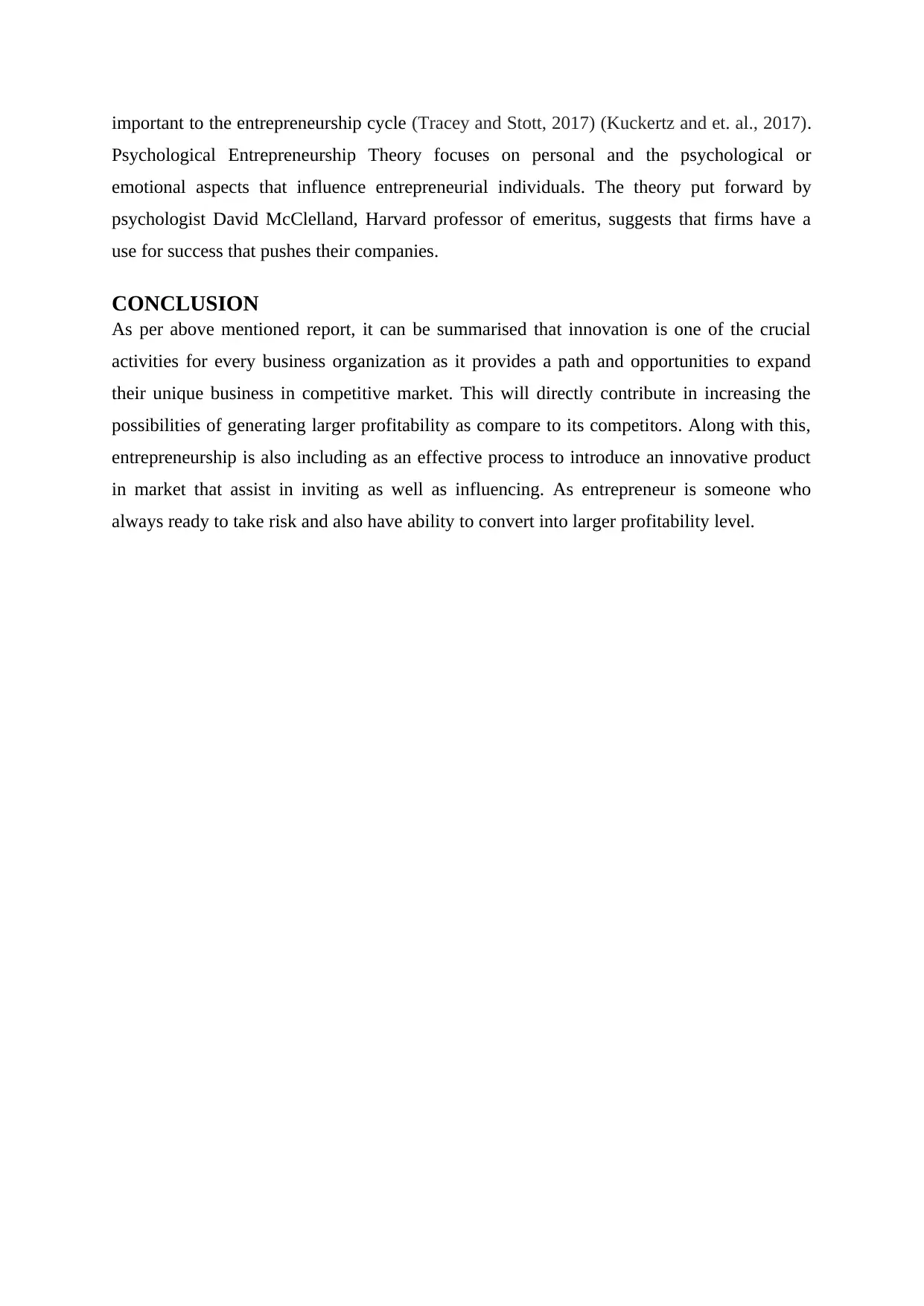
important to the entrepreneurship cycle (Tracey and Stott, 2017) (Kuckertz and et. al., 2017).
Psychological Entrepreneurship Theory focuses on personal and the psychological or
emotional aspects that influence entrepreneurial individuals. The theory put forward by
psychologist David McClelland, Harvard professor of emeritus, suggests that firms have a
use for success that pushes their companies.
CONCLUSION
As per above mentioned report, it can be summarised that innovation is one of the crucial
activities for every business organization as it provides a path and opportunities to expand
their unique business in competitive market. This will directly contribute in increasing the
possibilities of generating larger profitability as compare to its competitors. Along with this,
entrepreneurship is also including as an effective process to introduce an innovative product
in market that assist in inviting as well as influencing. As entrepreneur is someone who
always ready to take risk and also have ability to convert into larger profitability level.
Psychological Entrepreneurship Theory focuses on personal and the psychological or
emotional aspects that influence entrepreneurial individuals. The theory put forward by
psychologist David McClelland, Harvard professor of emeritus, suggests that firms have a
use for success that pushes their companies.
CONCLUSION
As per above mentioned report, it can be summarised that innovation is one of the crucial
activities for every business organization as it provides a path and opportunities to expand
their unique business in competitive market. This will directly contribute in increasing the
possibilities of generating larger profitability as compare to its competitors. Along with this,
entrepreneurship is also including as an effective process to introduce an innovative product
in market that assist in inviting as well as influencing. As entrepreneur is someone who
always ready to take risk and also have ability to convert into larger profitability level.
Paraphrase This Document
Need a fresh take? Get an instant paraphrase of this document with our AI Paraphraser
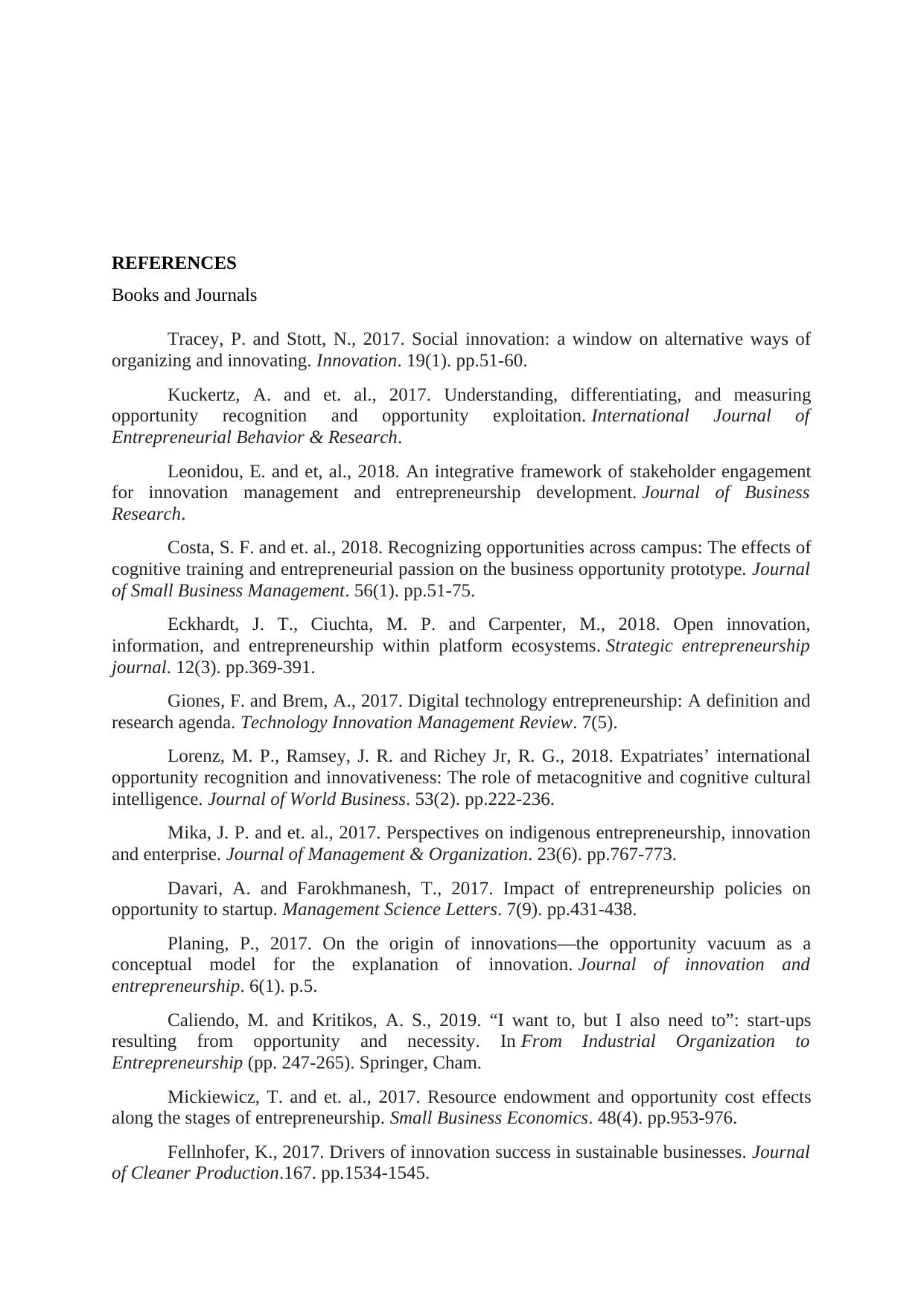
REFERENCES
Books and Journals
Tracey, P. and Stott, N., 2017. Social innovation: a window on alternative ways of
organizing and innovating. Innovation. 19(1). pp.51-60.
Kuckertz, A. and et. al., 2017. Understanding, differentiating, and measuring
opportunity recognition and opportunity exploitation. International Journal of
Entrepreneurial Behavior & Research.
Leonidou, E. and et, al., 2018. An integrative framework of stakeholder engagement
for innovation management and entrepreneurship development. Journal of Business
Research.
Costa, S. F. and et. al., 2018. Recognizing opportunities across campus: The effects of
cognitive training and entrepreneurial passion on the business opportunity prototype. Journal
of Small Business Management. 56(1). pp.51-75.
Eckhardt, J. T., Ciuchta, M. P. and Carpenter, M., 2018. Open innovation,
information, and entrepreneurship within platform ecosystems. Strategic entrepreneurship
journal. 12(3). pp.369-391.
Giones, F. and Brem, A., 2017. Digital technology entrepreneurship: A definition and
research agenda. Technology Innovation Management Review. 7(5).
Lorenz, M. P., Ramsey, J. R. and Richey Jr, R. G., 2018. Expatriates’ international
opportunity recognition and innovativeness: The role of metacognitive and cognitive cultural
intelligence. Journal of World Business. 53(2). pp.222-236.
Mika, J. P. and et. al., 2017. Perspectives on indigenous entrepreneurship, innovation
and enterprise. Journal of Management & Organization. 23(6). pp.767-773.
Davari, A. and Farokhmanesh, T., 2017. Impact of entrepreneurship policies on
opportunity to startup. Management Science Letters. 7(9). pp.431-438.
Planing, P., 2017. On the origin of innovations—the opportunity vacuum as a
conceptual model for the explanation of innovation. Journal of innovation and
entrepreneurship. 6(1). p.5.
Caliendo, M. and Kritikos, A. S., 2019. “I want to, but I also need to”: start-ups
resulting from opportunity and necessity. In From Industrial Organization to
Entrepreneurship (pp. 247-265). Springer, Cham.
Mickiewicz, T. and et. al., 2017. Resource endowment and opportunity cost effects
along the stages of entrepreneurship. Small Business Economics. 48(4). pp.953-976.
Fellnhofer, K., 2017. Drivers of innovation success in sustainable businesses. Journal
of Cleaner Production.167. pp.1534-1545.
Books and Journals
Tracey, P. and Stott, N., 2017. Social innovation: a window on alternative ways of
organizing and innovating. Innovation. 19(1). pp.51-60.
Kuckertz, A. and et. al., 2017. Understanding, differentiating, and measuring
opportunity recognition and opportunity exploitation. International Journal of
Entrepreneurial Behavior & Research.
Leonidou, E. and et, al., 2018. An integrative framework of stakeholder engagement
for innovation management and entrepreneurship development. Journal of Business
Research.
Costa, S. F. and et. al., 2018. Recognizing opportunities across campus: The effects of
cognitive training and entrepreneurial passion on the business opportunity prototype. Journal
of Small Business Management. 56(1). pp.51-75.
Eckhardt, J. T., Ciuchta, M. P. and Carpenter, M., 2018. Open innovation,
information, and entrepreneurship within platform ecosystems. Strategic entrepreneurship
journal. 12(3). pp.369-391.
Giones, F. and Brem, A., 2017. Digital technology entrepreneurship: A definition and
research agenda. Technology Innovation Management Review. 7(5).
Lorenz, M. P., Ramsey, J. R. and Richey Jr, R. G., 2018. Expatriates’ international
opportunity recognition and innovativeness: The role of metacognitive and cognitive cultural
intelligence. Journal of World Business. 53(2). pp.222-236.
Mika, J. P. and et. al., 2017. Perspectives on indigenous entrepreneurship, innovation
and enterprise. Journal of Management & Organization. 23(6). pp.767-773.
Davari, A. and Farokhmanesh, T., 2017. Impact of entrepreneurship policies on
opportunity to startup. Management Science Letters. 7(9). pp.431-438.
Planing, P., 2017. On the origin of innovations—the opportunity vacuum as a
conceptual model for the explanation of innovation. Journal of innovation and
entrepreneurship. 6(1). p.5.
Caliendo, M. and Kritikos, A. S., 2019. “I want to, but I also need to”: start-ups
resulting from opportunity and necessity. In From Industrial Organization to
Entrepreneurship (pp. 247-265). Springer, Cham.
Mickiewicz, T. and et. al., 2017. Resource endowment and opportunity cost effects
along the stages of entrepreneurship. Small Business Economics. 48(4). pp.953-976.
Fellnhofer, K., 2017. Drivers of innovation success in sustainable businesses. Journal
of Cleaner Production.167. pp.1534-1545.

⊘ This is a preview!⊘
Do you want full access?
Subscribe today to unlock all pages.

Trusted by 1+ million students worldwide
1 out of 9
Related Documents
Your All-in-One AI-Powered Toolkit for Academic Success.
+13062052269
info@desklib.com
Available 24*7 on WhatsApp / Email
![[object Object]](/_next/static/media/star-bottom.7253800d.svg)
Unlock your academic potential
Copyright © 2020–2026 A2Z Services. All Rights Reserved. Developed and managed by ZUCOL.





